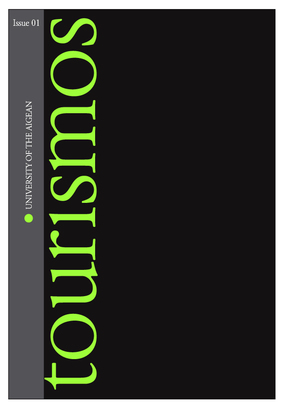Ecotourism development strategies for Caribbean tourism destinations
Part of : Tourismos : an international multidiciplinary journal of tourism ; Vol.8, No.1, 2013, pages 283-299
Issue:
Pages:
283-299
Section Title:
Research case studies
Author:
Abstract:
The paper offers a reflection on tourism issues and development strategies relating to Caribbean destinations, and more particularly, insular destinations. When faced with intense competition from popular destinations around the region, the smaller islands have had to reaffirm their market position. Mass tourism development models have not created the expected knock-on effects for these territories of limited size and vulnerable resources. Any wish for alternative tourism practices, which for this region essentially revolve around the term ecotourism, falls under the scope of badly coordinated tourism development and its ensuing over-concentration of infrastructures, land conflicts and policies of entrenchment, etc. Sharing tourism revenue and accessing resources are key elements to the debate. Development strategies in relation to alternative tourism practices are better able to meet the expectations of host territories.
Subject (LC):
Keywords:
ecotourism, resources, development, territorial strategies, Caribbean
Notes:
Περιέχει σχήματα, πίνακες και βιβλιογραφία
References (1):
- Breton, J.M. (2001). L’écotourisme: un nouveau défi pour la Caraïbe? Paris, Karthala.Brigulio, L., Archer, B., Jafari, J. & Wall, G. (1996). Sustainable Tourism in Islands and Small States: issues and policies. London, Pinter.Caribbean Tourism Organisation. (2002). Caribbean Tourism Statistical Report. St. Michael (Barbados), CTO.Daly, H.E. (1990). Sustainable growth: an impossibility theorem. Development Journal of Society for International Development, Vol. 3, No.4, pp.45-47.Dehoorne, O. (2006). L’avènement du tourisme de masse sous les tropiques. Eléments de réflexion sur les enjeux touristiques dans l’espace caribéen. Etudes Caribéennes, Vol. 4, pp.41-50.Dehoorne, O. (2007). Le tourisme dans les Caraïbes. Logiques régionales et enjeux environnementaux. Téoros, Vol. 5, pp.179-205.Dehoorne, O., Saffache, P. & Augier, D. (2007). Tourisme et écotourisme dans la Caraïbe. Eléments de réflexion sur les stratégies de développement. Etudes Caribéennes, Vol. 6, pp.27-47.Dodds, R. & Butler, R. (2010). Barriers to Implementing Sustainable Tourism Policy in Mass Tourism Destinations. Tourismos: An International Multidisciplinary Journal of Tourism, Vol. 5, No.1, pp.35-53.Duval, D.T. (2004). Tourism in the Caribbean. Trends, development, prospects. Routledge.Gerovassileiou, V., Koutsoubas, D., Sini, M. & Paikou, K. (2009). Marine Protected Areas & Diving Tourism in the Greek Seas: Practices and Perspectives, Tourismos: An International Multidisciplinary Journal of Tourism, Vol. 4, No.4, pp.181-197Goodland, R. (1992). The case that the world has reached its limits: more precisely that current throughput growth in the global economy cannot be sustained. Population and Environment, Vol. 13, No.3, pp.167-182.Hall, M.C. & Lew, A. (1998). Sustainable Tourism, a Geographical Perspective, Haslow, Longman Edit.Island Resource Foundation. (1996). Tourism and Coastal Resources Degradation in the Wider Caribbean. St. Thomas (IVA), Island Resources Foundation.Karmakar, M. (2011), Ecotourism and Its Impact on the Regional Economy – A Study of North Bengal (India). Tourismos: An International Multidisciplinary Journal of Tourism, Vol. 6, No.1, pp.251-270.Lockhart, D.G. & Drakakis-Smith, D. (1997). Island Tourism: trends and prospects. London, Pinter.López-Guzmán, T., Sánchez-Cañizares, S. & Pavón, P. (2011). Community-Based Tourism in Developing Countries: A Case Study. Tourismos: An International Multidisciplinary Journal of Tourism, Vol. 6, No.1, pp.69-84.Murat, C. (2007). L’écotourisme comme alternative touristique. Eléments de réflexions à partir de l’exemple dominicais, thèse Master Droit-Economie, Université des Antilles et de la Guyane.Patullo, P. (1996). Last Resorts: The Cost of Tourism in the Caribbean. London, Cassell.Raymond, N. (2007). Costa Rica: du petit pays « démocratique, sain et pacifique », au leader de l’écotourisme et de la protection de l’environnement. Etudes caribéennes, Vol. 6, pp.49-65.Saffache, P. (2000). Caractéristiques physiques, fonctionnements dynamiques et modalités de protection du littoral martiniquais. Terres d’Amérique, Vol. 3, pp.293-312.Sheller, M. (2003). Consuming the Caribbean: From Arawaks to Zombies. London and New York, Routledge.Spilanis I.P. & Karayiannis O.P. (2009). Tourism and Environment: Pressures of Tourism Related Construction Activity on the Natural Environment of Host Areas-Attempting a Survey in the Cyclades. Tourismos: An International Multidisciplinary Journal of Tourism, Vol. 4, No.4, pp.17-34.Weaver, D.B. (1988). The Evolution of a ‘Plantation’ Tourism Landscape on the Caribbean Island of Antigua. Tijdschrift voor Economische en Sociale Geografie, Vol. 79, pp.313-319.Weaver, D.B. (2001). Ecotourism as Mass Tourism: Contradiction or Reality? Cornell Hotel and Restaurant Administration Quarterly, Vol. 42, No.2, pp.104-112Wilkinson, P.F. (1999). Caribbean cruise tourism: delusion? Illusion? Tourism Geographies, Vol. 1, No.3, pp.261-282.Wilkinson, P.F. (2004). Tourism policy and Planning in St. Lucia. In S. Gössling (EdS.) Tourism and Development in Tropical Island (pp. 88-120), Cheltenham (UK): Edward Elgar.World Tourism Organisation. (2003). Sustainable development of Ecotourism. A Compilation of Good Practices in SMEs, Madrid, WTO.World Tourism Organisation. (2005). Americas. Madrid, WTO.World Tourism Organisation. (2006). Compendium of Tourism Statistics, Madrid, OMT.World Travel and Tourism Council. (2001). World Travel and Tourism Council, Year 2001. Tourism Satellite Accounting Research (Caribbean). London, World Travel and Tourism Council.




